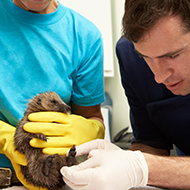
Charity promotes vital work of 'hardworking' hospitals and centres
The RSPCA has highlighted the continuous, dedicated effort by it's staff and volunteer teams during the pandemic; revealing that more than 22,000 animals were treated in it's hospitals across last year.
Several thousand operations were performed carried out across this period. Additionally, 2,495 animals were neutered, 6,261 vaccinated and 2,027 microchipped.
RSPCA chief veterinary surgeon Caroline Allen said: “2020 was a busy and challenging year for the veterinary profession as a whole and the RSPCA was no exception.
“I'm very proud of the work our fantastic teams have achieved and the procedures carried out by our hardworking hospitals and centres. Our staff have remained dedicated to animals throughout the coronavirus pandemic.
“We're also very grateful to all the vets in private practice across the country who have supported our Inspectorate and animal centres and provided veterinary care for RSPCA animals during this very difficult period.”
The charity treated all manner of animals in need during the pandemic, from abandoned, neglected dogs to a fox with it's head stuck in a sweet jar.
In total, 8,665 animals were seen as inpatients and 13,340 seen as outpatients in the RSPCA's animal hospitals.
The charity is appealing for help to support it's rescue teams who are continuing to help animals in need across the winter. The RSPCA received more than 44,000 calls to it's cruelty line this Christmas and is urging the public to donate and #JoinTheRescue to help it's teams continue to tackle cases of cruelty, abuse and neglect.



 The Veterinary Medicines Directorate (VMD) is inviting applications from veterinary students to attend a one-week extramural studies (EMS) placement in July 2026.
The Veterinary Medicines Directorate (VMD) is inviting applications from veterinary students to attend a one-week extramural studies (EMS) placement in July 2026.